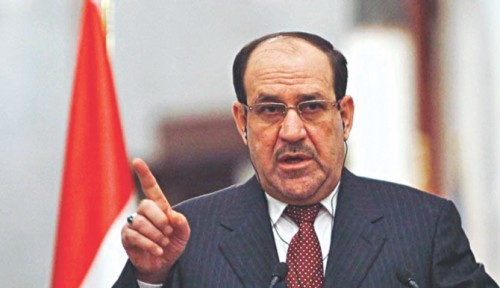UPDATE 1545 GMT: A helicopter in the relief operation for Yezidi refugees on Mount Sinjar has crashed.
The helicopter was carrying twenty refugees and Vial Dakhil, the MP whose emotional speech last weekend brought the crisis to international attention (see feature). All were injured.
See Iraq Audio Analysis: Why The US Intervened — And Will It Be Effective?
UPDATE 1515 GMT: Paralleling Iran’s withdrawal of support (see earlier entry) for Nuri al-Maliki, Iraq’s Shia militia are also endorsing his replacement as Prime Minister by Haidar al-Abadi.
Razaq Mhibis, a leading member of the Badr Brigades linked to cleric Moqtada al-Sadr expressed support for al-Abadi. Later, the Asa’ib Ahl al-Haq movement supported the nomination by the National Alliance bloc of Shia parties.
UPDATE 1455 GMT: A US armed drone struck an Islamic State mortar position near Mount Sinjar.
The attack is the third since last Friday on the jihadist positions near the mountain where thousands of Iraqi Yazidis are stranded.
US Central Command said the strike was air cover for Kurdish forces providing security for Yazidis trying to leave the mountainside.
UPDATE 0955 GMT: Iran is supporting the nomination of Haidar al-Abadi as Prime Minister.
The Secretary of the National Security Council, Admiral Ali Shamkhani, said this morning that Tehran backs the legal process which led to al-Abadi’s selection.
The Iranian regime had supported Prime Minister Nuri al-Maliki since the crisis of the insurgent offensive in mid-June, but in the last week it moved towards the conclusion that Maliki could not remain in power and restore stability.
UPDATE 0855 GMT: A UN human rights panel has warned that thousands of Yazidi face “potential genocide” unless they get immediate help.
The panel claimed verified reports that Islamic State jihadists, advancing in northwestern Iraq, are pursuing members of minority groups who are trapped in the area, giving them an ultimatum to convert to Islam or die.
The UN’s special rapporteur on minority issues, Rita Izsák, said:
All possible measures must be taken urgently to avoid a mass atrocity and potential genocide within days or hours – civilians need to be protected on the ground and escorted out of situations of extreme peril. The responsibility to protect populations at risk of atrocity crimes falls both on the Iraqi Government and the international community.
UPDATE 0725 GMT: CNN’s Ivan Watson describes a rescue operation for the Iraqis — mainly members of the Yazidi faith — stranded on Mount Sinjar in the northwest near the Syrian border. He says parents were throwing their children on board the helicopter:
UPDATE 0510 GMT: US fighter jets carried out four airstrikes on Monday night, targeting Islamic State checkpoints to the southwest and east of Mount Sinjar, where thousands of Iraqi refugees have fled and are at risk of death by exposure, thirst, and starvation.
The warplanes also hit checkpoints south and southeast of Sinjar city, seized by the jihadists on August 3, and and destroyed an armored personnel carrier and a Humvee.
However, Lieutenant General William Mayville assured reporters that the strikes would continued to be limited:
Our principal task to date, and what we are doing right now, is to protect US facilities and the citizens – American citizens – at those facilities. There are no plans to expand the current air campaign beyond the current self-defense activities.
Mayville said the US attacks “are unlikely to affect the Islamic State’s overall abilities or its operations in other areas of Iraq and Syria”.
Nuri al-Maliki is fighting for his political life after his former allies, backed by the US, effectively dismissed him on Monday.
Maliki, who had led Iraq since 2006, was pushed aside as the National Alliance of Shia parties nominated Deputy Speaker of Parliament Haidar al-Abadi as Prime Minister.
Pressure had grown on Maliki since an insurgent offensive took cities such as Mosul and Tikrit and advanced on Baghdad in mid-June; however, he had clung to power as Parliament was unable to name a replacement.
That suddenly changed on Sunday with the imminent selection of al-Abadi, who is a member of Maliki’s Dawa Party. Maliki tried to block the move with the deployment of special forces and tanks in the capital, but his former Shia allies persisted. By Monday afternoon, President Fuad Masum — only chosen last week by Parliament — was welcoming al-Abadi’s nomination.
A series of US officials, building up to Secretary of State John Kerry, commended the President and rejected Maliki’s claim that his dismissal was unconstitutional. On Monday night, President Obama hailed the “positive step”, making no reference to Maliki:
The only lasting solution is for Iraqis to come together and form an inclusive government.
This new leadership has a difficult task to regain the confidence of its citizens by governing inclusively and taking steps to demonstrate its resolve.
Maliki, who remains caretaker Prime Minister until al-Abadi is confirmed by MPs, continued to fight during the day. He appeared with about 30 of his supporters on TV to repeat that al-Abadi’s nomination was illegal, saying that Maliki’s State of Law faction — which won the largest number of Parliamentary seats in the April 30 elections, though far short of a majority — should have been approached first.
“I want to reassure everyone that don’t worry, everything that happened today is meaningless and we will still be here. I urge all the Mujahedeen army fighters and volunteers not to worry,” Maliki said.
His allies declared his removal a “Kurdish and American conspiracy”.

